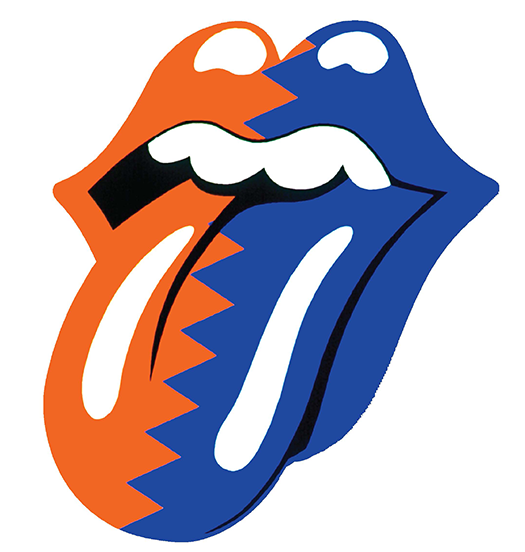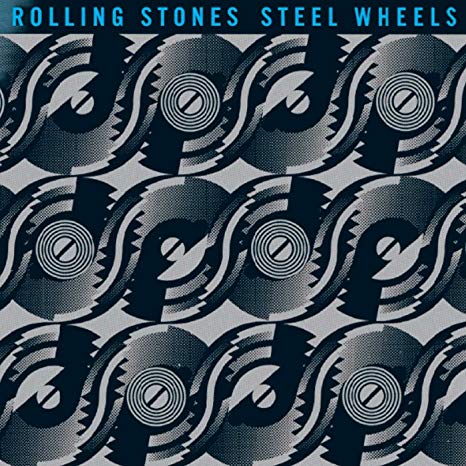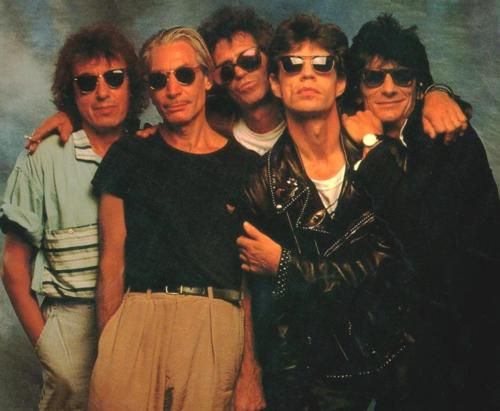Music journalism, books and more
Music Feature: Rock of Ages - The Rolling Stones
For a British rock band with a salacious past, the setting was devilishly ironic: a former girls' boarding school, nestled in the moneyed hills of New England. For eight weeks this summer, The Rolling Stones took possession of the secluded Wykeham Rise School in the small northwest Connecticut town of Washington - a two-hour drive from New York City - to prepare for the band's first concert tour in seven years. The three-month tour opened with a blast of raw energy last week in Philadelphia and made a two-concert stop in Toronto this week, before going on to Vancouver, Montreal and about 36 U.S. cities. On a balmy afternoon last month at Wykeham Rise, bassist Bill Wyman, guitarist Ron Wood and drummer Charlie Watts, about a dozen crew members and four foreign journalists were awaiting the arrival of the band's two most famous members. The sun was beginning to set on the stately old schoolhouse by the time a chauffeur-driven grey Lincoln pulled up the drive. Out stepped a tired-looking but immaculately dressed Mick Jagger, who strode through the front door past graduating-class photographs of fresh-faced debutantes in the lobby. An identical chauffeured Lincoln arrived carrying a rumpled and ravaged-looking Keith Richards - a conspicuous 20 minutes later. "Where are the girls?" one journalist asked Wyman. "Girls?" replied Wyman. "You got the wrong group - we're all married."
 It would appear that time, which The Rolling Stones claimed as an ally in their famous 1964 song, is no longer on their side. Once bad boys of rock'n' roll who caused parents to worry for their daughters' safety, the band members are all now nearing or over 50, and most have grown children of their own. All five musicians are either married or involved in apparently stable relationships. Watts, 52, has had the same spouse, Shirley, for 25 years. Only Wyman, the oldest band member at 53, seems restless in middle age: recently, he wed 19-year-old ex-model and singer Mandy Smith. In a curious twist, Wyman's 23-year-old son, Stephen, began dating Smith's mother.
It would appear that time, which The Rolling Stones claimed as an ally in their famous 1964 song, is no longer on their side. Once bad boys of rock'n' roll who caused parents to worry for their daughters' safety, the band members are all now nearing or over 50, and most have grown children of their own. All five musicians are either married or involved in apparently stable relationships. Watts, 52, has had the same spouse, Shirley, for 25 years. Only Wyman, the oldest band member at 53, seems restless in middle age: recently, he wed 19-year-old ex-model and singer Mandy Smith. In a curious twist, Wyman's 23-year-old son, Stephen, began dating Smith's mother.
Indeed, the scene at Wykeham Rise School last month was more of a cozy family affair than a frenzied rock reunion. When Wood, the newest and youngest member at 42, arrived for rehearsal, he drove up in a Volvo station wagon with his wife, Jo, and their two children, Leah, 11, and Tyrone, 6. Wood's 13-year-old son from a previous marriage, Jesse James, was acting as the group's office boy. There was little alcohol and barely a trace of junk food - mineral water and salads were the refreshments of choice - and all appearances indicated that the most potent drug on the premises was a strong pot of brewed coffee.
The Stones' current tour is the most prominent reminder that rock 'n' roll has hit respectable, responsible, even sensible middle age. Once considered strictly teenage music, rock this summer has become the domain of wrinkled rock stars - whose fans include baby boomers and teenagers alike. Radio, already saturated by golden oldies - or so-called classic rock - continues to treat the sounds of yesteryear as staples of the airwaves, while reunion tours by such geriatric bands as The Who, The Doobie Brothers and Jefferson Airplane dominate the concert circuit. The Beatles are also back: Ringo Starr, 49, is now touring with a band of celebrity musicians, including guitarist Joe Walsh and pianist Dr. John. And, in December, Paul McCartney, a greying 47, will begin his swing through North America.
In the wake of the 20th anniversary of the Woodstock Festival, a tidal wave of nostalgia has swept over the rock industry. And some critics, including Chuck Eddy of New York's influential Village Voice, deplore the backward-looking trend because they say it inhibits the growth of new music. "Rock's obsession with the past," said Eddy, "is the single biggest threat to its future." But Richards, 45, was adamant when he told Maclean's that there should be no mandatory retirement for rockers. "It's a fallacy that rock'n' roll is a juvenile, teenage music," he said. "It ain't like tennis - there's not a certain amount of years. The market for new music is already there. If it can't cut the mustard, then you'll get the previous generation's acts because they can."
 Of all the current tours by veteran artists, none has been more keenly awaited than that of The Rolling Stones, whose 40-city circuit is being run by Toronto-based promoter Michael Cohl. As rock's reigning elder statesmen, and the band that most clearly defines rock 'n' roll itself, the group has more to prove - and much to lose - by venturing back into the limelight. Last week, armed with a strong new album, Steel Wheels, the Stones roared back with a vengeance. At Veteran's Stadium in Philadelphia, before a capacity crowd of 55,000 that seemed evenly divided between old and new fans, the world's greatest - and oldest - rock 'n' roll band proved that it still had the passion and the energy to power a thrilling 2 1/2-hour performance.
Of all the current tours by veteran artists, none has been more keenly awaited than that of The Rolling Stones, whose 40-city circuit is being run by Toronto-based promoter Michael Cohl. As rock's reigning elder statesmen, and the band that most clearly defines rock 'n' roll itself, the group has more to prove - and much to lose - by venturing back into the limelight. Last week, armed with a strong new album, Steel Wheels, the Stones roared back with a vengeance. At Veteran's Stadium in Philadelphia, before a capacity crowd of 55,000 that seemed evenly divided between old and new fans, the world's greatest - and oldest - rock 'n' roll band proved that it still had the passion and the energy to power a thrilling 2 1/2-hour performance.
On a 90-m stage that resembled an industrial wasteland - with giant, steaming airducts, long orange catwalks and steel girders - the Stones opened their show in the dark, a percussion track accelerating into an engine-like roar. Suddenly, a wall of flames ignited across the foot of the stage. Then, with a boom of fireworks, the lights came up and the Stones kicked into a rugged version of "Start Me Up." Jagger, dressed in a white bow tie and green leather tails, quickly had the crowd chanting "Make a grown man cry" along with him on the chorus.
After that bold opening, the concert stalled when the band blew out a sound-system generator in the middle of the third number, "Shattered." But the Stones soon revved up again, offering a mix of their best-known material from the past three decades and cuts from the new album. Jagger, who played both guitar and harmonica on some songs, found his spark in the middle of the concert - when two 55-foot inflatable dolls in scant clothing appeared instantaneously on either side of the stage as he sang "Honky Tonk Woman." From then on, Jagger was more expressive and theatrical. Later, perched on the highest catwalk, he struck his Lucifer pose and gave a chilling performance of "Sympathy for the Devil," the band's dark Woodstock-era anthem from the Altamont Festival in 1969. Richards, dressed like a happy-go-lucky vagabond in jeans, torn purple vest and brightly colored shirt, was Jagger's laid-back foil throughout the concert, providing inspired support on rhythm guitar.
Like the tour, the new album - their 34th - is designed to offer something for everyone, from die-hard older Stones fans to skeptical younger listeners raised on rock in the 1980s. Produced by Chris Kimsey and The Glimmer Twins (a pseudonym for Jagger and Richards), Steel Wheels opens with Jagger's tough-rocking romantic taunt, "Sad Sad Sad," and closes with Richard's gentle, melancholic ballad "Slipping Away." Many of the songs in between strike a familiar chord. Jagger adopts his trademark sexual boasting on "Terrifying," while the quirky country-blues on "Break the Spell," with Jagger on harmonica and Wood on a steel guitar, recalls songs from the band's 1968 classic, Beggar's Banquet. Overall, Steel Wheels bristles with more bravado than the Stones have demonstrated since they released the supercharged, disco-flavored Some Girls in 1978.
 Although the new record lacks the unpredictable, menacing tone of the Stones' best work, it may well become known as a minor classic itself, largely because it captures the creative sparks that fly when the wilful Jagger and the more visceral Richards work together. Jagger and Richards have spent much of the 1980s at odds over the direction of the Stones. Each has worked separately, and their differences have threatened to break up the band. The album is the result of their reconciliation last year. Sitting in what was once the art instructor's office at Wykeham Rise last month, Richards - sipping from a plastic cup holding his favorite bourbon, Rebel Yell - told Maclean's, "This album is in the classic Rolling Stones mould of Mick and I actually sitting down together and writing songs as we used to do in the motels in the earlier days on the road." Richards, who was dressed in a light, ankle-length black coat and seemed fatigued but contented, said that he and Jagger wrote the songs for Steel Wheels - while staying at the Eddy Grant studio complex in Barbados last January - in only two weeks. "Working on a deadline has been great," he said. "You go for the immediacy, rather than a technically better version that loses that immediacy, which I think is the essential ingredient of rock 'n' roll."
Although the new record lacks the unpredictable, menacing tone of the Stones' best work, it may well become known as a minor classic itself, largely because it captures the creative sparks that fly when the wilful Jagger and the more visceral Richards work together. Jagger and Richards have spent much of the 1980s at odds over the direction of the Stones. Each has worked separately, and their differences have threatened to break up the band. The album is the result of their reconciliation last year. Sitting in what was once the art instructor's office at Wykeham Rise last month, Richards - sipping from a plastic cup holding his favorite bourbon, Rebel Yell - told Maclean's, "This album is in the classic Rolling Stones mould of Mick and I actually sitting down together and writing songs as we used to do in the motels in the earlier days on the road." Richards, who was dressed in a light, ankle-length black coat and seemed fatigued but contented, said that he and Jagger wrote the songs for Steel Wheels - while staying at the Eddy Grant studio complex in Barbados last January - in only two weeks. "Working on a deadline has been great," he said. "You go for the immediacy, rather than a technically better version that loses that immediacy, which I think is the essential ingredient of rock 'n' roll."
Before Richards and Jagger settled their disputes, the quality of the Stones' music was suffering badly. Earlier recordings such as Tattoo You were uneven works, and the 1986 album Dirty Work found them wrestling for control of the group and writing songs separately. At Wykeham Rise before the tour began, 46-year-old Jagger - dressed in stylish grey trousers and a bright-blue patterned shirt - told Maclean's that he felt the problem was that the Stones had become lodged in an artistic rut. Said Jagger: "I got very impatient with them because they wouldn't try anything new. Even the ballads weren't very interesting anymore." Shifting his body restlessly, he added, "I got a bit bored with it." The band never toured to support Dirty Work because Jagger opted instead to focus on his solo work - a fact that remains a sore point for Richards. Jagger's breakaway produced two albums, the timid She's the Boss in 1985 and the lightweight but more polished Primitive Cool in 1987.
While Jagger was off on his own, a new dynamic emerged among the rest of the Stones, who had been left in limbo. Richards, who was left in a kind of caretaker role, said: "I'd learned a lot of things by being the don, the top man. The buck stopped with me for the last three years." He added, "I learned a lot more self-discipline and more of a sense of responsibility." When both of Jagger's solo albums turned out to be commercial flops and his planned American tour had to be cancelled, he found himself turning back to the Stones. He approached Richards and the others about reuniting late in 1987. That time, Richards, the band's most committed member, was in a position to say no: he had begun recording his own solo album. The result, last year's roughly hewn and spirited Talk is Cheap, drew a positive response from critics who hailed its return to Stones basics: no-nonsense lyrics and tough-guy guitar. It even included one song, "You Don't Move Me," that took a swipe at Jagger's two failed solo efforts: "Now you want to throw the dice/You already crapped out twice."
By the time Richards had completed a small U.S. tour, he was ready to resume his work with the Stones - although this time on a more equal footing with Jagger. The two reconciled in late 1988, travelling to Barbados last January to begin writing. The result was 40 songs - their most prolific session since the mid-1960s. Looking back on it, Jagger is reluctant to give too much credit to his restored partnership with Richards. "To be honest, there are some things on this album that could've been done with me and a computer," he said, "and some things Keith could've done, equally, on his own."
 Both Jagger and Richards say that solo work has enhanced their musicianship and helped to bring more of a balance to the group. For one thing, Richards, who rarely took on lead vocals with the Stones in the past, sings two tracks on the album and several songs on the tour in his newly confident, raspy voice. And Jagger - traditionally a singer only - plays a wide assortment of instruments on the album and tour. And on Steel Wheels, Jagger displays a new seriousness as a songwriter. The composition "Rock and a Hard Place" conveys his views on global politics, ecology and the world that his children will inherit (he has two offspring, Scarlett, 5, and James, 4, with companion Jerry Hall; an 18-year-old daughter, Jade, from his marriage to Bianca Jagger; and 19-year-old Karis from his liaison with actress Marsha Hunt). Although renowned as a jet-setter and a multimillionaire with homes in New York, London, Mustique, Texas and France's Loire Valley - and as a fashion follower with a passion for late-night dancing - Jagger is an avid reader who worries about such issues as urban congestion and acid rain. "If such friendly countries as Canada and the United States can't sort out the problem," he said, "what chance have we got of making deals with China to stop them from building factories that are going to cause acid rain in Alaska?"
Both Jagger and Richards say that solo work has enhanced their musicianship and helped to bring more of a balance to the group. For one thing, Richards, who rarely took on lead vocals with the Stones in the past, sings two tracks on the album and several songs on the tour in his newly confident, raspy voice. And Jagger - traditionally a singer only - plays a wide assortment of instruments on the album and tour. And on Steel Wheels, Jagger displays a new seriousness as a songwriter. The composition "Rock and a Hard Place" conveys his views on global politics, ecology and the world that his children will inherit (he has two offspring, Scarlett, 5, and James, 4, with companion Jerry Hall; an 18-year-old daughter, Jade, from his marriage to Bianca Jagger; and 19-year-old Karis from his liaison with actress Marsha Hunt). Although renowned as a jet-setter and a multimillionaire with homes in New York, London, Mustique, Texas and France's Loire Valley - and as a fashion follower with a passion for late-night dancing - Jagger is an avid reader who worries about such issues as urban congestion and acid rain. "If such friendly countries as Canada and the United States can't sort out the problem," he said, "what chance have we got of making deals with China to stop them from building factories that are going to cause acid rain in Alaska?"
While he was clearly comfortable discussing current affairs, Jagger - ever the self-conscious performer - offered little in the way of personal revelations. By contrast, Richards was refreshingly candid and forthright about both himself and the Stones. Now a family man with a wife, model Patti Hansen, and two children, Theodora, 4, and Alexandra, 3, (he has two others, Marlon, 20, and Angela, 17, from his relationship with actress Anita Pallenberg), he displays a quiet self-assurance. On Jagger, who has been both his nemesis and alter ego in the group, he said: "To be Mick Jagger and not do anything for two years, it's like, `Can I cut it again?' You're getting older, maybe you're going down. That kind of thing can build up on a guy's brain until he gets this fear of going out and doing it."
Richards was just as forthcoming about his past problems with drugs. He became addicted to heroin in the late 1960s and says that he kicked the habit a decade later, after he was convicted for possession of the substance in Toronto in 1977. The guitarist now claims that he always maintained a measure of control with drugs. "I come from sturdy stock," he said, "and I've always felt it was important to know your body. Even in the darkest days of dope, I was never rash. I always made sure that what I was taking was what I was taking. In other words, I became an amateur chemist."
 As for explaining the Stones' longevity, Richards is equally open. "It's such a joy to play with these guys, it doesn't matter what else is going on - just lock'em in a room with the instruments, and something happens." Some of their contemporaries agree that the Stones have survived because they can still generate the kinetic energy that is central to rock 'n' roll. Said the irrepressible Tina Turner, 49: "With them, you just put on your jeans and your leather and you get out there and rock." Turner, who was in Toronto last month to promote the upcoming release of her new album, Foreign Affair, has decided to give up touring herself in favor of an acting career. But she insists that the spirit of rock 'n' roll is ageless. Turner added: "People might as well stop asking about whether rock can survive. Certain things is here to stay. It's like miniskirts - they keep trying to take them out, and they keep coming back." Veteran rock critic Robert Hilburn of the Los Angeles Times attributes the Stones' longevity to the enduring quality of their songs. "Great bands and their music last, just like a great book or a great film."
As for explaining the Stones' longevity, Richards is equally open. "It's such a joy to play with these guys, it doesn't matter what else is going on - just lock'em in a room with the instruments, and something happens." Some of their contemporaries agree that the Stones have survived because they can still generate the kinetic energy that is central to rock 'n' roll. Said the irrepressible Tina Turner, 49: "With them, you just put on your jeans and your leather and you get out there and rock." Turner, who was in Toronto last month to promote the upcoming release of her new album, Foreign Affair, has decided to give up touring herself in favor of an acting career. But she insists that the spirit of rock 'n' roll is ageless. Turner added: "People might as well stop asking about whether rock can survive. Certain things is here to stay. It's like miniskirts - they keep trying to take them out, and they keep coming back." Veteran rock critic Robert Hilburn of the Los Angeles Times attributes the Stones' longevity to the enduring quality of their songs. "Great bands and their music last, just like a great book or a great film."
Through changing times and fashions, the Stones keep rolling on, much to the surprise of those who thought that artists could not rock past middle age. "We're all supposed to have died, or faded away," singer Joe Cocker, best known for his gravelly renditions of Beatles songs, told Maclean's last week with a touch of sarcasm. For the battle-scarred Richards, one of pop music's toughest survivors, rocking well into his autumn years has become something of a mission. Said Richards, leaning back in his chair and looking out reflectively over the private school grounds that served as the Stones' headquarters this summer: "It would feel like running away from the field of battle not to take it as far as it can go. Rock 'n' roll is a young music and nobody's got to the end." And then Richards, the father of raunchy rock as well as four children, added, "Besides, growing up, maturing, is the best trip there is."
Originally published in Maclean's September 11, 1989


